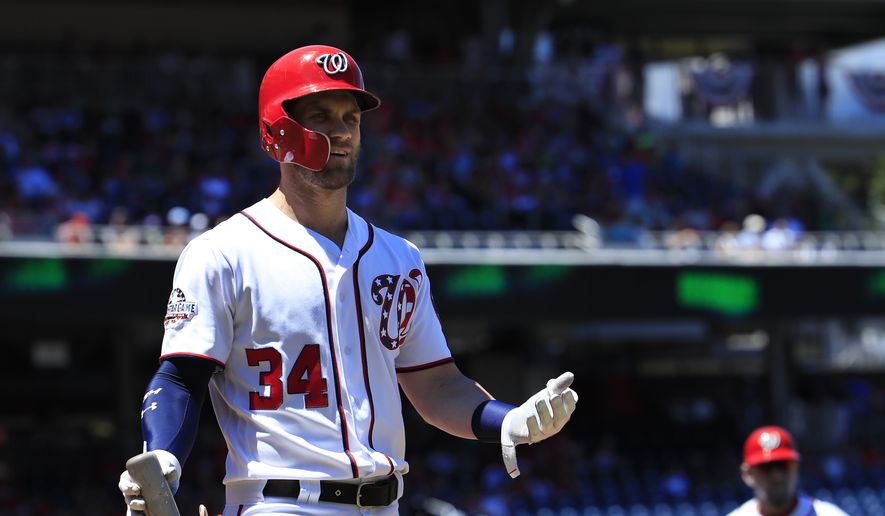Legalized sports betting carries consequences for everyone

By DERON SNYDER (as published in The Washington Times)
In case you wondered, Bryce Harper was favored to win the All-Star Home Run Derby at +225, according to sportsbooks monitored by OddShark.com. Chicago Cubs slugger Kyle Schwarber was the second choice at +333.
If you preferred an alternative source and a different presentation of odds – maybe wagers in $100 increments aren’t your thing – Bovada had Harper atop the board at 11/4, followed by Milwaukee’s Jesus Aguilar at 7/2. Schwarber trailed the field, tied with Houston third baseman Alex Bregman, arguably a bargain at 9/1.
As for the game itself, SportsInteraction.com has the American League at -140 (compared to +120 for the NL). The site also offers a plethora of propositions involving runs per inning, the score at various junctures, winning margin, etc.
Anyone who wagers on All-Star games might need an intervention.
Then again, Westgate Las Vegas offered championship odds on the 30 teams in Vegas for Summer League – from 8/1 on Phoenix to 50/1 on Denver and Minnesota.
Risking cash on an assortment of prospects, suspects and rejects is a special strain of crazy. But by the time next year’s Midsummer Classic rolls into Cleveland, we’ll be in the midst of a full-blown outbreak. We’re already seeing signs with nationwide legal sports betting in its embryonic state.
According to figures released by New Jersey last week, two casinos and a racetrack took in $16.4 million in sports bets during the first two weeks such wagers were legal. As plaintiff in the recent Supreme Court decision that OK’d sports gambling from coast to coast, New Jersey is at the forefront. Its casinos are racing to have their operations set up and approved by state regulators in time for the NFL season, the mother lode for sportsbooks.
No longer relegated to fleeting references buried amid other talking points, mentions of spreads, over/unders, teases, and the like, will enjoy new emphasis in the fall.
Gambling shows will emerge from the shadows and slide into primetime light. New businesses will sprout. Local bookmakers will fade away. And problem gamblers will multiply.
Sure, there’ll be requisite warnings and appeals for the addicted to seek help. The same strategy was in place two-and-a-half years ago when MGM National Harbor opened in Prince George’s County, Md. The company was required to spend more than normal on its “responsible gaming” campaign, yet calls to Maryland’s gambling helpline have increased.
Forgetting about affected individuals is easy when its not your family that’s torn apart or your house facing foreclosure. The same is true for another group that’s sure to be negatively impacted by the impending wave of betting. Take it from NFL Players Association executive Casey Schwab, who last week addressed state legislators and gaming industry officials.
“There are serious consequences, particularly for the athletes,” Schwab said via ESPN, outlining concerns about players’ private and on-field lives. “Because of those consequences, the athlete’s voice must be heard, particularly as we contemplate sports betting in the country.”
Unlike choosing lottery numbers, a totally random act, sports bettors rely on information.
Lottery players don’t know anything about the pingpong balls, and such knowledge wouldn’t be helpful anyway. Conversely, bettors who learn something about the starting pitcher, first-string quarterback, or opposing point guard, gain an edge in placing their wagers.
That makes information king. Everyone who possess a nugget potentially becomes a pawn eligible for payment.
Injuries, illness, late night carousing, family drama, marital strife … all of those could into odds and spreads. That means everyone from equipment managers to front office officials might be valuable to gamblers, who couldn’t care less about privacy issues.
Here’s another example: Someone in LeBron James’ inner circle theoretically could’ve gotten 20-1 odds on picking the Lakers to win the NBA title; the proposition was shortened to 7-2 after James’ decision.
“That information – what our athletes are doing, where they’re going – has a price tag on it,” Schwab said. “And as more money goes into sports betting, that price tag goes up.”
I don’t blame athletes and league for wanting a cut. It’s their lives and their product.
Letting Vegas, offshore enterprises and illegal bookies profit off sports betting forever was one thing. But it’s something else altogether once the entire country can get in on the action.
In addition to lottery addicts – usually on the lowest income and education rungs – I feel sorry for current and future compulsive sports gamblers. The Supreme Court did them no favor by expanding legal sports betting.
Although I don’t feel sorry for Harper, Washington quarterback Alex Smith, winger Alex Ovechin, or other athletes who’ll face increased invasions of privacy and expressions of venom, accepting million-dollar paychecks shouldn’t mean it’s OK if you’re dehumanized in process.
But I bet most folks won’t care.
— Brooklyn-born and Howard-educated, Deron Snyder writes his award-winning column for The Washington Times on Tuesdays and Thursdays. Follow him on Twitter @DeronSnyder.
 Follow
Follow
